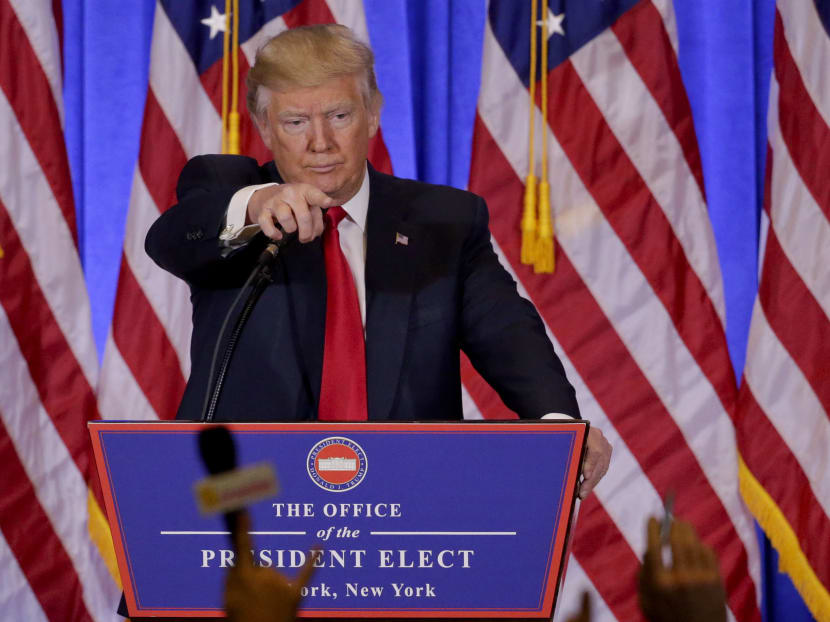US spy agencies in crisis over Trump claims
WASHINGTON — An escalating civil war between American President-elect Donald Trump and the United States intelligence community is presenting the country’s spies with their biggest crisis since the failures in the run-up to the Iraq war.

President-elect Donald Trump takes questions during a news conference, Wednesday, Jan. 11, 2017, in New York. The news conference was his first as President-elect. Photo: AP
WASHINGTON — An escalating civil war between American President-elect Donald Trump and the United States intelligence community is presenting the country’s spies with their biggest crisis since the failures in the run-up to the Iraq war.
By blaming intelligence agencies for the possible leak of a dossier detailing alleged efforts by the Kremlin to cultivate and compromise him, and drawing parallels to “Nazi Germany”, Mr Trump has declared war on officials who pride themselves for their non-partisan professionalism.
“This is the first time that I know of where a president has accused (intelligence agencies) of having a political position ... and that really challenges this industry that works very hard to be non-partisan,” said Mr Cortney Weinbaum, a former intelligence officer now at the Rand Corporation.
“This is certainly unprecedented in my experience,” said Mr John Rizzo, a former top lawyer at the Central Intelligence Agency (CIA) and author of a book, Company Man, about his 30-plus years at the agency. “I can’t remember anything approaching this level. Or any criticism like this coming from a sitting president or an incoming president, and none of the seven presidents I served under in my three decades.”
Mr Trump’s attack, via Twitter and then a press conference on Wednesday (Jan 11), was aimed primarily at the public release by BuzzFeed of a 35-page dossier that was assembled by a former British intelligence officer for a private investigation company. The dossier carries unverified allegations that the Trump camp colluded with the Kremlin in a disinformation campaign against his rival, Mrs Hillary Clinton, and agreed to steer the election debate away from Russia’s behaviour in Ukraine.
The Trump campaign has denied the allegations and called the entire dossier false.
Mr Trump said if intelligence officials did divulge details of the allegations to the media, it would be a “tremendous blot on their record”.
That attack took tensions between the President-elect and the intelligence community, which have been growing in recent months over allegations of Russian interference in last year’s election, to new levels. It also risks exacerbating the divide within Mr Trump’s Republican party over Russia, and how to investigate the Kremlin’s alleged involvement.
Senator John McCain, the former Republican presidential nominee who has called for a rigorous probe into Russia’s role in the election, confirmed on Wednesday that he had received the dossier and passed it to FBI director James Comey “late last year”.
Mr McCain has already split from his party leaders by calling for a bipartisan select committee to investigate Russia’s role in email hacking, echoing a demand from top Senate Democrat Chuck Schumer. The Republican Senate majority leader Mitch McConnell has rebuffed calls for a select committee, saying existing committees are capable of reviewing the issues.
Analysts said the public fight between Mr Trump and the intelligence community carries risks. Mr Rizzo said that the appointment of Mr Mike Pompeo, the Kansas congressman Mr Trump has chosen to lead the CIA, was being welcomed by agency veterans he had been in touch with. Former senator Dan Coats, whom the incoming President has chosen to be director of national intelligence, was also respected, he said.
But among their first tasks would be fighting to maintain morale in an intelligence community not taking kindly to Mr Trump’s attacks. “The choices of Pompeo and Coats are very good ones,” Mr Rizzo said. “That’s the good news. But their commander-in-chief, their boss, is certainly not making anything easy for them.”
Ms Susan Hennessey, a former National Security Agency lawyer now at the Brookings Institution, said Mr Trump’s response was “advancing a false and dangerous narrative that the US intelligence community leaked this information and did so out of revenge. Neither of which is true.”
A tweet in which Mr Trump accused intelligence agencies of failing to stop the leak “reads as if (Mr) Trump is trying to deflect focus from these devastating, though unverified allegations, by attempting additional smears vilifying intelligence professionals,” she said.
“For now, the actual story is that the intelligence community and law enforcement are taking these claims seriously enough to take them to the president,” Ms Hennessey said. “The fact that there is this kind of investigation into an incoming President is itself completely remarkable.”
“We’re in a very strange space,” said Ms Olga Oliker, director of the Russia and Eurasia programme at the Center for Strategic and International Studies.
Regardless of their veracity, the revelations were likely to raise questions over Trump administration policy towards Russia for some time, she said, unless some sort of independent authority could establish the facts. Moreover, by battling the intelligence establishment, the President-elect was only adding to the questions and their capacity to dog his administration.
“The intelligence community has a reason to believe that they tried to interfere in the election, which is a different kind of behaviour and one that you should want to stop and respond to,” Ms Oliker said. “If the President-elect, once inaugurated, is not interested in pursuing these things, that would strike me as running counter to US interests. You want to know what the truth is.”
The risk was also that by hurting morale in the intelligence communities you could create an environment that might lead to further leaks, or worse, analysts warned.
“When you risk lower morale within the intelligence community, you raise (the) risk of disgruntled employees. You do not want disgruntled employees in your intelligence agencies,” Ms Weinbaum said. FINANCIAL TIMES






